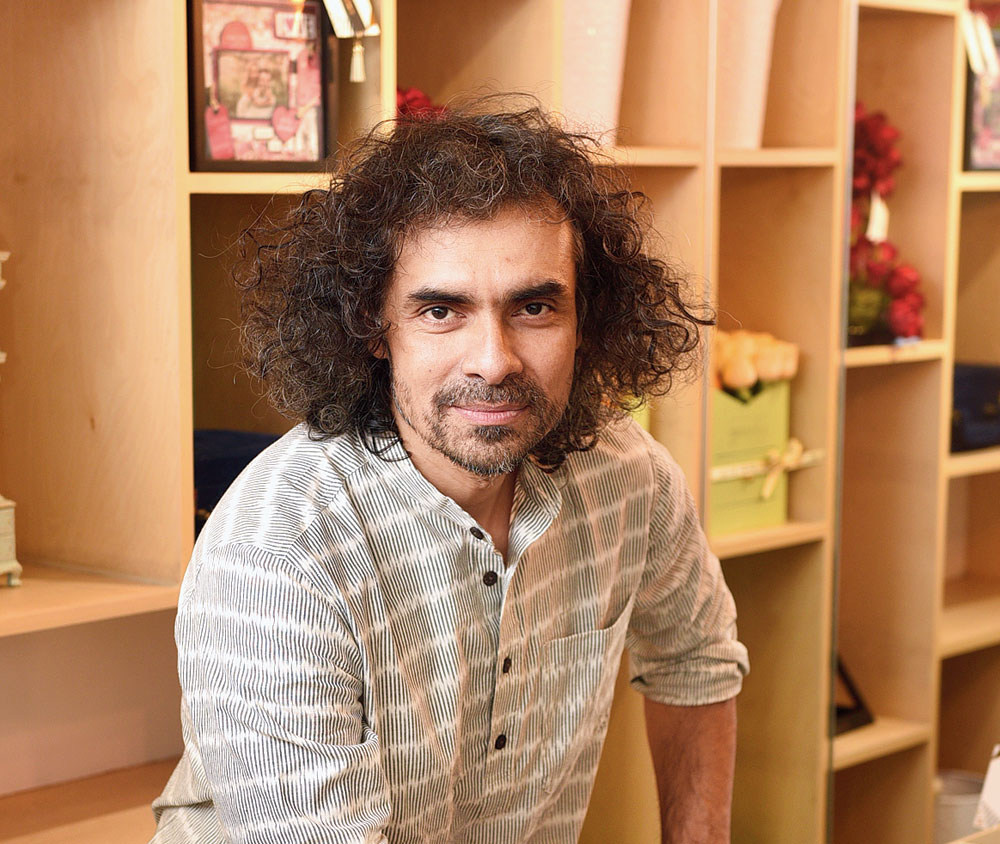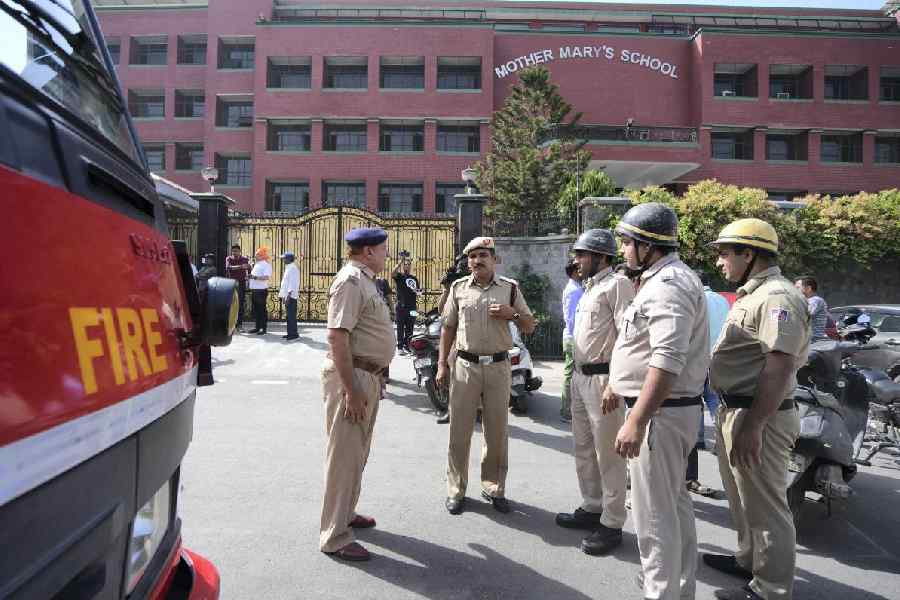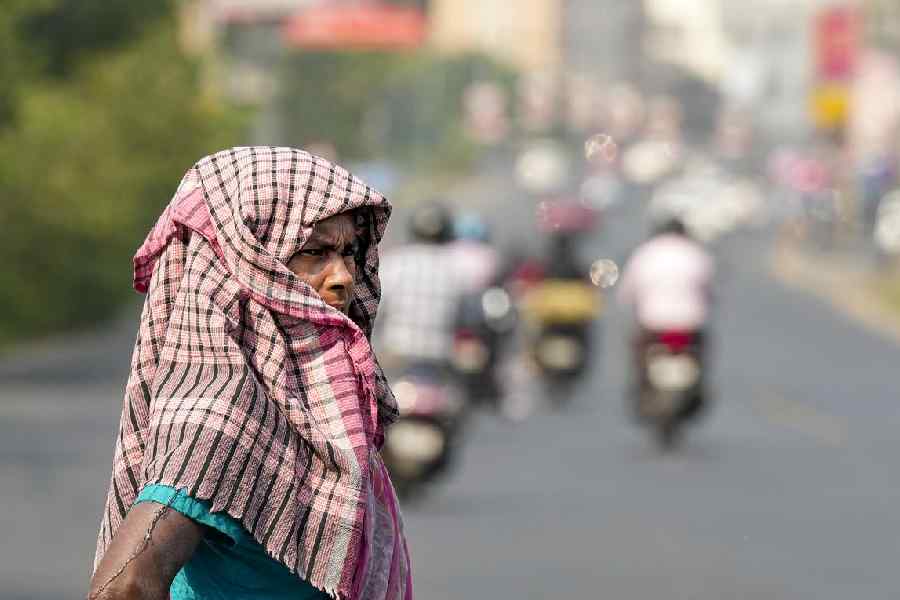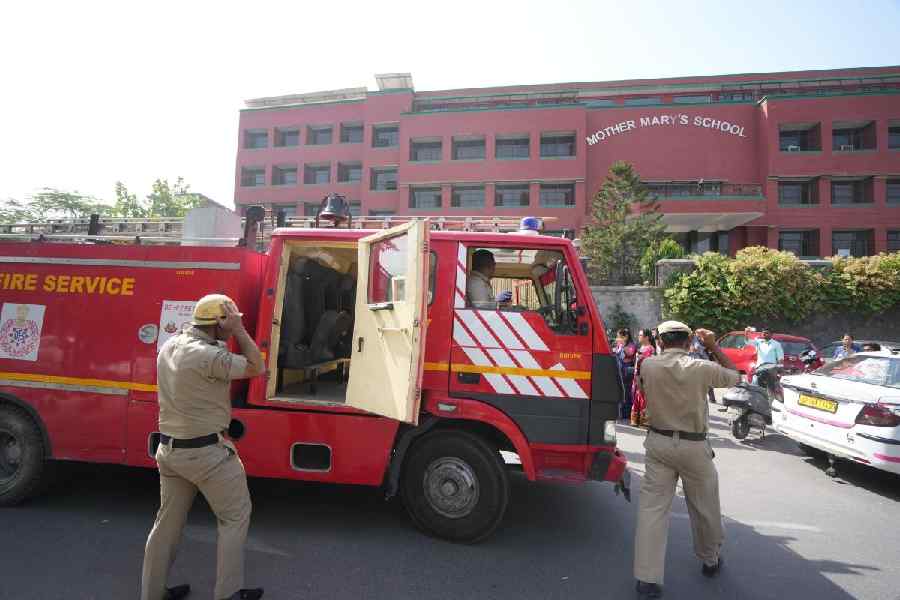Imtiaz Ali wastes no time in going up to the street-side jhalmuri seller — sitting outside The Lavender Label store in Ballygunge (for whose launch the filmmaker was in town recently) — and fixing himself a packet of jhalmuri. Sporting a kurta, denims, his signature frizzy hair and a stubble, the man behind films like Jab We Met, Rockstar and Tamasha was chatting with The Telegraph in his car and tucking into jhalmuri when he suddenly stopped the car and jumped out at a busy intersection to buy some salted guava slices. In between bites, Imtiaz got talking about his films, his inspirations and what romance means to him.
What do you love the most about Calcutta?
My favourite thing in Calcutta is the food. I think Calcutta is a blessed city and everyone living here is living a charmed life, although they don’t know it. When you complain about traffic and potholes, you should firstly come to Bombay and see how much worse that is. Secondly, you should relish the food and the tea… there are different kinds of food here. There’s the best Mughlai in the country, the best Chinese in the country and, of course, the best Bengali food and sweets in the country.
You even made your own jhalmuri now…
Jhalmuri! It’s not even my most favourite thing but the street food is the best! Food is the best thing here and that’s only the beginning to the cultural ethos of Calcutta. I think culturally and artistically, this is the most superior city in the country.
Have people told you that your films have changed their lives?
Yeah, yeah. Especially after Tamasha, a lot of people…. If I’m in a public space, every day I get people who come out of their cars, leave what they are doing and say this. And they don’t want pictures or autographs. They just want to say that they saw a film, they left their jobs, left whatever was not working for them and it changed their lives. It’s really incredible.
Has it happened the other way, where a fan anecdote has left you introspecting as a filmmaker?
After Tamasha, the first show that I went to watch was at a single screen at night. There were people who weren’t really getting it that much but still, since they saw me, they were praising the film. This was in the stalls of Chandan Cinema in Juhu (Mumbai) and a group of people came out and stood around me discussing it and generally taking pictures. And I saw a lady, not a young lady, she was around my age… she walked up to me after a while and just said, ‘You should’ve made this film earlier. It’s too late now’. And she just walked away. I can’t get rid of that memory because it seemed like she wanted to say, ‘Almost 20 years back, wish I could change the course of my life.’ Tamasha, Rockstar and Highway always garner very strong reactions.
You’ve seen highs with films like Jab We Met and lows with others like Jab Harry Met Sejal. How do you handle the crests and troughs?
By the time you’ve finished one film, you’re already thinking about another story. It takes care of you emotionally because you’re already ahead of it. If a filmmaker cares for the money the film earns, and I do as well, it matters… but the kind of emotional attachment that a person has to a movie luckily gets over when I finish making it.
So the fate of Jab Harry Met Sejal didn’t affect you?
Of course it affected me. But I stand by the film because I made all these films with the same sort of attention. It’s not as though, ‘This time I’m making a movie called Jab Harry Met Sejal, let me make it badly’. I wasn’t making it for the heck of it.
Of course, there are some movies that do better than you expect and some movies that do worse than you expect. Jab Harry Met Sejal did worse than anybody expected. But it’s fine, because I was already thinking of other stories, doing other things. I wish it had done better because you wish every film of yours is the most popular movie in the world.
What does success mean to you now?
I don’t feel any different from before. It’s not as though success, like a new car or a new house, has come and changed anything. It’s not as though it gives me some sort of entitlement or anything of that sort.
Music has always played a crucial role in your films. What do you keep in mind during the song selection process for it to seamlessly blend with the narrative?
I just feel that I should enjoy the process of making music a lot. The songs, the tunes and melody that I enjoy the most... those are the ones I go for. Since I am the writer and the director, during the music sitting, I carry the film with me. I’m writing and thinking all the time.
Irshad Kamil, A.R. Rahman and you are like the holy trinity. Can you take us through the process of how you work together?
Usually, there is a lot of discussion. Rahman sir and I chat a lot about things that might not even be relevant to the topic. He has a very innate sense of understanding the inner soul of what I’m trying to say. Then Irshad joins in and we talk, talk, talk... and very instinctively, at some point of time, Rahman sir makes some sort of tune that is the beginning or he asks Irshad to write something, so invariably one or the other starts it. Rahman sir’s process is that there is no process. Each song I have made with him is different, so I can’t tell you how it happens. But it starts with a lot of talking and understanding.
Do you have any crazy behind-the-scenes story about working with A.R. Rahman?
I have one story! Once, really late at night, Rahman sir took Irshad and me for a drive in Chennai. It was during the making of Tamasha. The police caught us because he must have made a wrong turn or something. He was driving and it was very late at night. The police was scolding him and he was trying to say, ‘I don’t know where my licence is and where my papers are. No, I was not cutting the line’. And then, he was trying to be recognised. Finally they recognised him and clicked pictures with him and let us go! (Laughs)
What’s your favourite song from your films?
I hate most of the songs because you listen to it too many times. There are many songs in my films that I cannot stand — those are good songs though. The songs that I do not mind listening to are only a few, one of them is Phir se ud chala (Rockstar) and the other is Dooriyan (Love Aaj Kal).
Not Agar tum saath ho from Tamasha?
I don’t like Agar tum saath ho... I mean, no longer.
There are so many lines in your films that are so profound. Where does it come from?
I don’t know... aate hain ghaib se yeh mazamin khayal mein, Ghalib had said (smiles).
What is this Sufi vibe you have all about?
Maybe because my hair is long, I don’t shave and dress up. People must be saying, ‘Yeh bada Sufi banda hai’. I don’t do anything... beyond a point of time I think I shouldn’t challenge what people are thinking. Maybe they’re right but that’s not how I think of myself.
Which is your favourite dialogue from your films?
In Tamasha I like, ‘Apni kahaani mujhse pooch raha hai? Kaayar. Kis se darta hai? Hain kaun yahaan? Tu bataa kya hota hai aage? Bataa. Bol apni kahaani’. It’s like people are scared of something but who the f*** is here man? Why are you scared? There is no one actually, it’s you who is talking to yourself through your dad, or other people in society... there is no one. Actually it’s you who decides.
You had mentioned that certain scenes in Tamasha are inspired from your life…
If it’s very embarrassing, I won’t tell you. Sometimes, some scenes... you realise in retrospect are things you’ve gone through in life or seen somewhere.
A character in your film that’s closest to the real you?
There are parts in everybody that think like me. There is a certain mindlessness to Jordan (Ranbir Kapoor in Rockstar) that I can sometimes associate with. Also, there is a sarcastic frustration that I have felt… my life was not exactly like Ved’s (Ranbir in Tamasha), I was preparing to but I didn’t go for engineering, but then there are some situations that I can associate with, like talking to the mirror and all that.
Do you know that when people watch your films they feel like leaving everything immediately and taking off to far-off places?
(Laughs) Because I do that! Again, the movie that I’m making right now isn’t too much about travel. I love travelling and it shows in my films.
You say you aren’t a romantic person and yet the language that the characters speak in your films are anything but. Where does the inspiration come from?
All the inspiration comes from the people that I see around me, close to me, sometimes far… but there are recognisable traits which I get influenced by and which find their way into the work that I do.
What do you keep in mind while writing these characters?
I try to not bullshit. I try to say things that make sense to me.
Is it true that Sara Ali Khan and Kartik Aaryan are doing Love Aaj Kal 2 and Saif Ali Khan is playing Sara’s father?
I cannot say anything because we have not announced any movie. But Saif and I are not doing a film together right now, for sure. That’s all I can say.
Are you making a film based in Calcutta?
Not right now. My production company (Window Seat Films) is doing an untitled digital series and developing many other films. That’s why there’s a lot of speculation about what is happening… I was writing and developing many stories. I’m producing and writing the digital series but I’m not directing it. Something on Calcutta is also planned, but not right now.
Do you agree that your films have a certain pattern — a scenic location, a confused hero who doesn’t understand the worth of the heroine, only to come back to her in the end?
All these three things do not feature in the film that I’m making next. I don’t disagree or agree but if you’re saying it, I don’t dispute it. It’s not as though when I start writing a film, I think of how different I can make it from anything that I’ve done before.
While writing a film, do you get inspired by your own life or is it mostly observation?
Sometimes it’s some experiences you’ve had, mixed with other people’s experiences mixed with imagination. Imagination is the large part of it. Sometimes even to tell you my real story I’ll use a little imagination so that it makes sense to you… because there is a lot of randomness in between.
What has been your most personal film so far?
I’ve been most involved with Rockstar… emotionally very hooked to it while making it.
How much of a contribution did you have in making your brother Sajid Ali’s Laila Majnu that released last year?
I co-wrote it… the vision was mine, the story or take was mine.
Why didn’t you direct it yourself?
I wanted somebody younger to do it. I kind of knew how I would do it and for me, that was not so interesting. I thought let someone who has fresher ideas do it, someone who has not made many films before, then he will come up with something more interesting.
Apparently the original title of Love Aaj Kal was ‘Elastic’, Tamasha was ‘Window Seat’ and Jab Harry Met Sejal was ‘The Ring’. How do all your film titles change from English to Hindi?
I write in English and I write like a novella. It keeps becoming fatter and fatter and then at some point of time I start writing Hindi dialogues. Usually, you can’t decide a title right at the beginning. You just work on a story, start writing it and then think, ‘Ah, this is like a ring because it’s in circular motion like the ring itself’. But there has to be a file name when you start writing, right? So, it’s a working title. And it was ‘Elastic’ because the harder you pull away from each other, more the tension or attraction to come back. That was what was happening if you look at the film... the elasticity of the film is an important thing. Main door jaa raha hoon ya paas aa raha hoon? That is the whole thing about the film.










